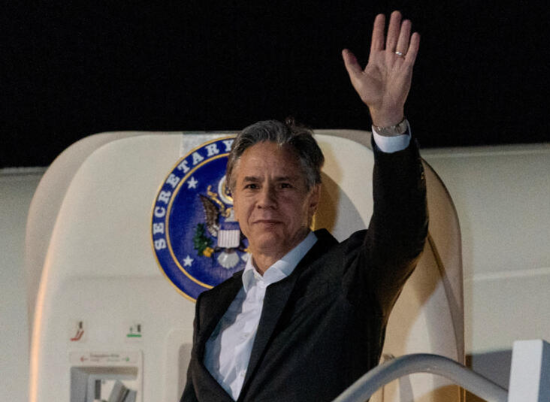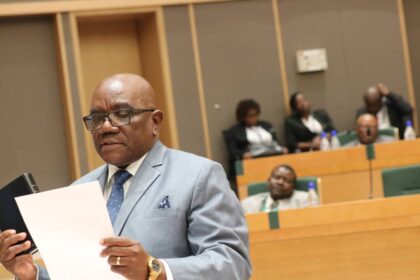By Pearl Matibe in Washington D C
To strengthen ties and build futures, U.S. Secretary of State Antony Blinken is embarking embark on a tour across Cabo Verde, Cote d’Ivoire, Nigeria, and Angola this week―from 21 – 26 January.
This strategic visit follows the extraordinarily successful U.S.-Africa Leaders’ Summit held in December 2022 and aims to assess and demonstrate the United States’ commitment to implementing the summit’s key commitments and discussions.
The excitement surrounding the trip is palpable, as Secretary Blinken is eager to display the progress made in various areas of collaboration between the U.S. and African nations. Central to the discussions will be the economic partnership between the nations, with a focus on promoting the development of commercial ties that contribute to mutual prosperity.
Key among Blinken’s interests is the longstanding partnership, particularly in the realm of health and food security. As expressed by the Secretary’s spokesperson, the trip is an opportunity to highlight the positive capacities of the African people, especially the youth, and showcase forward-looking engagements, such as the U.S.’s partnership with Angola in outer space.
The itinerary includes diplomatic engagements on multiple fronts, emphasizing the continuous commitment to global conversations. Issues such as peace and security, particularly in the Democratic Republic of the Congo (DRC), the Sahel and Coastal West Africa, will take center stage. In Cote d’Ivoire, discussions will align with the ongoing Africa Cup of Nations, adding a vibrant touch to the diplomatic mission.
Assistant Secretary for African Affairs Molly Phee said on Thursday in Washington, “In Cote d’Ivoire, they’re hosting now the Africa Cup of Nations. So, the whole continent is focused on that. There are about 24 nations playing soccer – or football, as they call it – in Cote d’Ivoire, so there’s a lot of energy, so I think it will be a really fun stop.”
“When we’re in Cote d’Ivoire, we’ll talk about the situation in the Sahel and coastal West Africa. Nigeria is dealing with a lot of internal security challenges. We’ve had a longstanding security partnership with Nigeria, which has been battered, as you know, by ISIS-WA, by Boko Haram, and by internal, what they call bandits.”
The U.S. Secretary of State recognizes the significance of addressing internal security challenges in Nigeria and commends Angola for its crucial role in reducing tensions in the eastern Congo. These security issues underscore the importance of an integrated approach, as highlighted by the Global Fragility Act, acknowledging that neglecting governance, economic development, and climate change can hinder achieving lasting solutions.
The Blinken’s engagements will also touch upon ongoing projects, including a joint initiative in five coastal states in West Africa, emphasizing the importance of governance and economic development in ensuring security and stability. The Secretary’s meeting in Angola will delve into regional processes like the Luanda Process and the Nairobi Process, seeking to support and consolidate efforts to address tensions in the eastern Democratic Republic of Congo.
“We’re so excited to go to Cabo Verde. It’s like a literal metaphor. We have had two Millennium Challenge Compacts that have contributed to Cabo Verde’s development, including the port in Praia,” said Assistant Secretary for African Affairs Molly Phee. The visit to Cabo Verde holds special significance, highlighting the positive impact of U.S. investment and infrastructure in Africa. With two Millennium Challenge Compacts contributing to Cabo Verde’s development, discussions will extend to the potential for a third regional compact. Cabo Verde’s role as a democratic model and a key partner in environmental and maritime issues further emphasizes the importance of this stop.
In response to questions about U.S.-China competition in Africa, Molly Phee emphasized that Africa’s importance stands on its own merits, not as part of a perceived soccer match between global powers. Highlighting U.S. engagement in infrastructure projects like the Lobito project in Angola and pharmaceutical support in Nigeria, the Blinken’s tour aims to address African concerns, collaborate on global norms, and foster mutual development.
As Secretary Blinken embarks on this diplomatic travel, the visits promise to be not just an assessment of commitments but a celebration of shared values, progress, and the potential for a brighter future in U.S.-Africa relations.
“We think this trip will hopefully be very positive. A lot of times the news out of Africa is negative. I think it can highlight the great capacity of the African people, particularly the youth. It can show really forward-looking types of engagements – for example, our partnership with Angola in outer space. And I think it will demonstrate the advances that Africans have made that will contribute to the continued progress on the continent,” said Phee.
Pearl Matibe is a Washington, DC-based White House Correspondent, and media commentator with expertise on U.S. foreign policy, and international security. You may follow her on Twitter: @PearlMatibe



